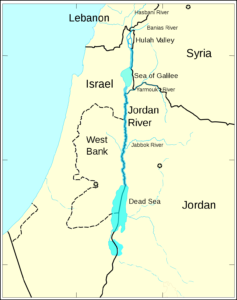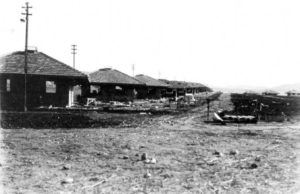 In 1927, Pinchas Rutenberg, founder of the Palestine Electric Company, signed an agreement with King Abdullah I of Jordan to build a hydroelectric power station on the territory of Transjordanian Emirate. Construction of the Naharayim hydroelectric power plant began in 1928. Tel Or was built near the power plant to house the permanent employees and their families. Tel Or was settled in 1930 and was the only Jewish village in Transjordan at the time. Residents also farmed thousands of dunams of land and sold some of the produce at a company workers’ supermarket in Haifa. The town lasted until its depopulation in 1948 during the Arab-Israeli War, when it was overrun by Iraqi and Transjordanian forces and destroyed.
In 1927, Pinchas Rutenberg, founder of the Palestine Electric Company, signed an agreement with King Abdullah I of Jordan to build a hydroelectric power station on the territory of Transjordanian Emirate. Construction of the Naharayim hydroelectric power plant began in 1928. Tel Or was built near the power plant to house the permanent employees and their families. Tel Or was settled in 1930 and was the only Jewish village in Transjordan at the time. Residents also farmed thousands of dunams of land and sold some of the produce at a company workers’ supermarket in Haifa. The town lasted until its depopulation in 1948 during the Arab-Israeli War, when it was overrun by Iraqi and Transjordanian forces and destroyed.
 After the establishment of the state of Israel on 14 May, 1948, Jordan, immediately attacked the new country. It gained control of the West Bank, and expelled its remaining Jewish population. In direct contravention of the 1949 armistice agreements, Jordan did not permit Jews access to their holy sites or to the Jewish cemetery on the Mount of Olives. In 1950, Jordan illegally annexed the territories it had captured in the 1948 war – eastern Jerusalem and the West Bank.
After the establishment of the state of Israel on 14 May, 1948, Jordan, immediately attacked the new country. It gained control of the West Bank, and expelled its remaining Jewish population. In direct contravention of the 1949 armistice agreements, Jordan did not permit Jews access to their holy sites or to the Jewish cemetery on the Mount of Olives. In 1950, Jordan illegally annexed the territories it had captured in the 1948 war – eastern Jerusalem and the West Bank.
The Jewish Quarter of the Old City was destroyed and its residents expelled. Fifty-eight synagogues were destroyed, their contents looted and desecrated. Some Jewish religious sites were turned into chicken coops or animal stalls. The Jewish cemetery on the Mount of Olives, where Jews had been burying their dead for over 2500 years, was ransacked; graves were desecrated; thousands of tombstones were smashed and used as building material, paving stones or for latrines in Arab Legion army camps. The Intercontinental Hotel was built on top of the cemetery and graves were demolished to make way for a highway to the hotel. The Western Wall became a slum area.
 Jordan lost the West Bank during the 1967 Six-Day War, but did not relinquish its claim to the West Bank until 1988. Jordan significantly reduced its military participation in the subsequent 1973 war against Israel. Jordan eventually signed the Israel-Jordan Treaty of Peace in 1994, normalizing relations between the two countries. However, Jordanian cartoons, articles, postings on social media, and public statements by politicians continued to present negative images of Jews and conflate anti-Israel sentiment with anti-Semitic sentiment.
Jordan lost the West Bank during the 1967 Six-Day War, but did not relinquish its claim to the West Bank until 1988. Jordan significantly reduced its military participation in the subsequent 1973 war against Israel. Jordan eventually signed the Israel-Jordan Treaty of Peace in 1994, normalizing relations between the two countries. However, Jordanian cartoons, articles, postings on social media, and public statements by politicians continued to present negative images of Jews and conflate anti-Israel sentiment with anti-Semitic sentiment.
Some 60,000 to 80,000 Israeli tourists have visited Jordan following the 1994 Israel-Jordan treaty. After the Second Intifada, Israeli tourism to Jordan declined greatly, as a result of anti-Israeli agitation among a wide segment of the population.
There are no Jewish communities in recent times. This may have something to do with the fact that Jews are prohibited under Jordanian law from owning property or acquiring citizenship. Today, the only Jews of Jordan are a trickle of American aid workers and Israeli officials at the local embassy.